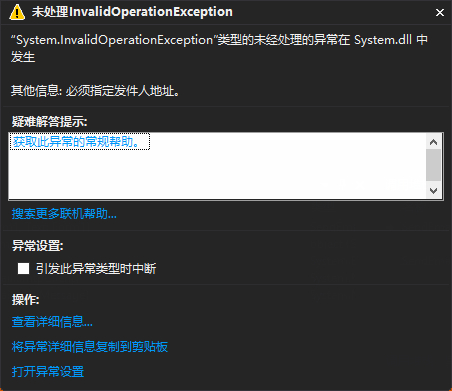今天在看C#高级编程(第9版)的时候,在768页看到这样的一段代码
SmtpClient sc = new SmtpClient(); sc.Host = "邮箱服务器地址"; MailMessage mm = new MailMessage(); mm.Sender = new MailAddress("公司邮箱", "发件人"); mm.To.Add(new MailAddress("我的163邮箱", "接收人")); mm.CC.Add(new MailAddress("抄送的邮箱", "抄送人")); mm.Subject = "测试程序发送邮件"; mm.Body = "<b>我发送了邮件---我是程序发出的</b>"; mm.IsBodyHtml = true; mm.Priority = MailPriority.High; sc.Send(mm);
以前没有做过Email项目,所以,直接就敲到了VS下,编译,但是出问题,报了个错

我心思是没有指定发件人的用户名和密码,因此又增加了一行代码
sc.Credentials = new System.Net.NetworkCredential("发件邮箱", "密码");
但是依然报这个错误,继续找办法吧,看了看网上其他人发邮件的代码,发现他们用的是From,因此,又增加了一行代码
mm.From = new MailAddress("公司邮箱", "发件人");
发现顿时就好使了,而且两个可以同时存在,或单独From存在,都好使。
这……我就郁闷了,因为F12定位到定义,From和Sender的注解里面只差了一个字

一个是发信人,一个是发件人,而且From是发信人,Sender是发件人,一字之差不应该Sender不好使,From好使啊,疑惑增加ing……
那就用ILSpy反编译看一下吧

我擦,更加疑惑,不可能只是因为From比Sender多了一个判断是否为null就用From吧。
那就继续看反编译的代码吧。在SmtpClient里找到Send方法,代码如下
public void Send(MailMessage message) { if (Logging.On) { Logging.Enter(Logging.Web, this, "Send", message); } if (this.disposed) { throw new ObjectDisposedException(base.GetType().FullName); } try { if (Logging.On) { Logging.PrintInfo(Logging.Web, this, "Send", "DeliveryMethod=" + this.DeliveryMethod.ToString()); } if (Logging.On) { Logging.Associate(Logging.Web, this, message); } SmtpFailedRecipientException ex = null; if (this.InCall) { throw new InvalidOperationException(SR.GetString("net_inasync")); } if (message == null) { throw new ArgumentNullException("message"); } if (this.DeliveryMethod == SmtpDeliveryMethod.Network) { this.CheckHostAndPort(); } MailAddressCollection mailAddressCollection = new MailAddressCollection(); if (message.From == null) { throw new InvalidOperationException(SR.GetString("SmtpFromRequired")); } if (message.To != null) { foreach (MailAddress current in message.To) { mailAddressCollection.Add(current); } } if (message.Bcc != null) { foreach (MailAddress current2 in message.Bcc) { mailAddressCollection.Add(current2); } } if (message.CC != null) { foreach (MailAddress current3 in message.CC) { mailAddressCollection.Add(current3); } } if (mailAddressCollection.Count == 0) { throw new InvalidOperationException(SR.GetString("SmtpRecipientRequired")); } this.transport.IdentityRequired = false; try { this.InCall = true; this.timedOut = false; this.timer = new Timer(new TimerCallback(this.TimeOutCallback), null, this.Timeout, this.Timeout); string pickupDirectory = this.PickupDirectoryLocation; switch (this.DeliveryMethod) { case SmtpDeliveryMethod.Network: goto IL_235; case SmtpDeliveryMethod.SpecifiedPickupDirectory: break; case SmtpDeliveryMethod.PickupDirectoryFromIis: pickupDirectory = IisPickupDirectory.GetPickupDirectory(); break; default: goto IL_235; } if (this.EnableSsl) { throw new SmtpException(SR.GetString("SmtpPickupDirectoryDoesnotSupportSsl")); } bool allowUnicode = this.IsUnicodeSupported(); this.ValidateUnicodeRequirement(message, mailAddressCollection, allowUnicode); MailWriter mailWriter = this.GetFileMailWriter(pickupDirectory); goto IL_275; IL_235: this.GetConnection(); allowUnicode = this.IsUnicodeSupported(); this.ValidateUnicodeRequirement(message, mailAddressCollection, allowUnicode); mailWriter = this.transport.SendMail(message.Sender ?? message.From, mailAddressCollection, message.BuildDeliveryStatusNotificationString(), allowUnicode, out ex); IL_275: this.message = message; message.Send(mailWriter, this.DeliveryMethod > SmtpDeliveryMethod.Network, allowUnicode); mailWriter.Close(); this.transport.ReleaseConnection(); if (this.DeliveryMethod == SmtpDeliveryMethod.Network && ex != null) { throw ex; } } catch (Exception ex2) { if (Logging.On) { Logging.Exception(Logging.Web, this, "Send", ex2); } if (ex2 is SmtpFailedRecipientException && !((SmtpFailedRecipientException)ex2).fatal) { throw; } this.Abort(); if (this.timedOut) { throw new SmtpException(SR.GetString("net_timeout")); } if (ex2 is SecurityException || ex2 is AuthenticationException || ex2 is SmtpException) { throw; } throw new SmtpException(SR.GetString("SmtpSendMailFailure"), ex2); } finally { this.InCall = false; if (this.timer != null) { this.timer.Dispose(); } } } finally { if (Logging.On) { Logging.Exit(Logging.Web, this, "Send", null); } } }
看代码里我注红色的部分,可以发现,Send方法,必须要求From存在,如果From不存在的话,就会抛出异常,但是并没有强制要求Sender存在,Sender可以存在,如果Sender存在就用Sender,不存在就用From,但是必须保证From存在。